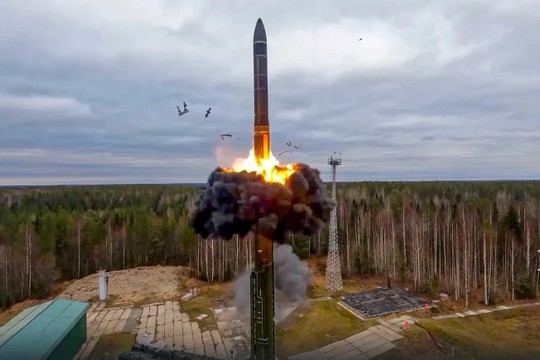An intercontinental ballistic missile is fired from a launch site in northwest Russia as part of nuclear drills on Oct. 26, 2022
Photo: Russian Defense Ministry Press Service
As Moscow proceeds, slowly but surely, to protect its borders from an aggressive NATO, there is currently a considerable amount of Western media-inspired hysteria about Moscow’s impending installation of tactical nuclear weapons in Belarus. To understand the real backstage to Moscow’s position, we need, as always, to look at the background, writes William Mallinson, a professor at Guglielmo Marconi University, Italy, a former member of Her Majesty's Britain diplomatic service.
Ever since the US’s genocide of hundreds of thousands of Japanese civilians at Hiroshima and Nagasaki, which prompted Moscow to take the horror of nuclear weapons seriously, debate has raged around Henry Kissinger’s suggestion in 1957 of limited nuclear war in Europe as an option. In an infamous book, he saw Europe as the object of Britain’s staging area in an East-West conflict. He regarded Europe within a NATO context alone, and one that must have American nuclear missiles.
Even though Britain was initially sceptical, saying that the adoption of a theory of limited war in Europe might destroy the efficacy of the deterrent, various countries eventually succumbed to the stationing of short- and medium-range weapons on their territory, even the once independent-minded Netherlands.
Even before the current de facto war between NATO and Russia, the US had an estimated 100 nuclear warheads stored across Europe on air bases in Belgium, Germany, Italy, the Netherlands and Turkey. Once President Trump had unilaterally suspended the US from the Intermediate Range Nuclear Forces Treaty in 2019, Moscow had no option but to do the same, then following the US’s withdrawal from the Open Skies Treaty.
Moscow observed the undermining of international law and incipient chaos resulting from irrational American behaviour, just as it saw Washington and its British butler using the EU as its human shield, à la Kissinger.
Moscow obviously felt that it had to restore some strategic sanity, especially after the British Foreign Secretary, Liz Truss, announced that she was willing to hit Britain’s nuclear button if necessary – even if meant global annihilation.
It is hardly surprising that Moscow suspended its participation in the new Strategic Arms Reduction Treaty (START) two days before it began its military operations in the Ukraine. The final straw came when the UK announced that it was sending depleted uranium shells to the Ukraine, despite the evidence that they cause not only long-lasting environmental damage, but cancer, as in the illegal attack on Belgrade in 1999.
There is a natural tendency to compare the current nuclear Western media hysteria with the Cuban missile crisis of October 1962, when there was almost a direct nuclear exchange between Washington and Moscow. One clear difference is that Moscow is not reciprocating American’s stationing of nuclear missiles near its borders by installing missiles in Cuba, Venezuela, Colombia, Mexico, and/or Brazil, preferring for the time being to merely increase military and economic collaboration with those countries.
Moscow is however reciprocating the American nuclear threat, in Europe, in the hope that the EU will understand that Washington is using it as a human shield, and will at some point realise that it is but a pawn, and push for negotiations to end the fighting in the Ukraine, despite the UK’s, Poland’s and the Baltic statelets’ leaderships’ irrational and atavistic hatred of Russia.
The problem is that there is no John F. Kennedy, but rather an increasingly extreme and irrational core of neo-cons and neo-libs, with an incipiently senile and ineffective president, that has not yet fully grasped that Russia is beginning to consider that its very existence is under threat. Hence the likelihood of a nuclear-armed Belarus. Moscow has long realised that NATO’s ‘humanitarian’ wars are but a cover for continuing its megalomaniac world-control policy, if necessary over Europe’s dead body.
A final factor in this potentially nuclear standoff is that most EU governments are feeding anti-Russian propaganda to a compliant mainstream media, simply to keep in power. Anti-NATO demonstrations rarely receive much coverage. This could however change, as more and more Europeans begin to realise that they are suffering economically to protect American shareholders, stresses William Mallinson.
read more in our Telegram-channel https://t.me/The_International_Affairs

 11:44 10.05.2023 •
11:44 10.05.2023 •























